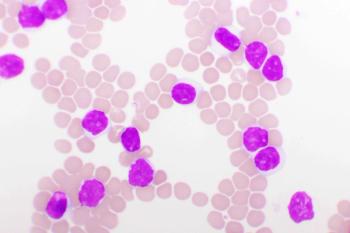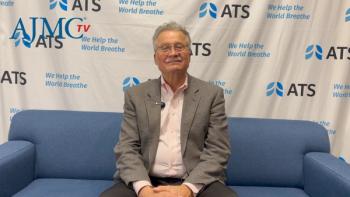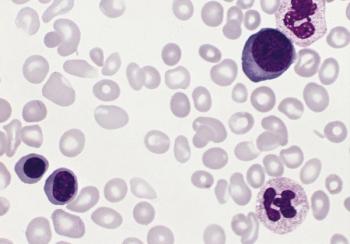
Sundar Jagannath, MBBS, highlights long-term follow-up data from the phase 1b/2 CARTITUDE-1 trial, showing durable responses and potential cures with ciltacabtagene autoleucel in patients with relapsed/refractory multiple myeloma.

Sundar Jagannath, MBBS, highlights long-term follow-up data from the phase 1b/2 CARTITUDE-1 trial, showing durable responses and potential cures with ciltacabtagene autoleucel in patients with relapsed/refractory multiple myeloma.

Marla Black Morgan, MD, looks to the future of research in both myasthenia gravis and rare neurological disorders by expanding data collection and identifying areas of potential difference in patient outcomes.

An artificial intelligence (AI)-driven machine learning model was refined and validated internationally to accurately classify acute leukemia subtypes from routine laboratory data, according to Merlin Engelke, MS, offering a potential tool for improving diagnosis worldwide.

The timing of immunotherapy initiation is not a significant factor in the outcomes of patients with extensive-stage small cell lung cancer (ES-SCLC), a study found.

In this clip, Adela Perolla, MD, PhD, discusses the urgent need to address and destigmatize burnout in hematology, especially among early-career professionals, by promoting self-awareness, work-life balance, and peer support.

Burnout is rising sharply in hematology due to emotional strain, long hours, and high patient demands, according to Adela Perolla, MD, PhD, impacting both physician well-being and patient care.

Ola Landgren, MD, PhD, shares ADVANCE trial results, which show that adding daratumumab to carfilzomib-lenalidomide-dexamethasone (DKRd) improves outcomes in newly diagnosed multiple myeloma.

Ola Landgren, MD, PhD, lead investigator of the ADVANCE clinical trial, outlines the study’s goal of advancing modern, minimal residual disease–guided treatment approaches.

Both monotherapy and combination therapy containing epcoritamab had high response rates and survival benefits when compared with usual care.

Two posters presented at the 2025 European Hematology Association Congress support combination therapy with daratumumab, bortezomib, lenalidomide, and dexamethasone (DVRd) in transplant-ineligible or deferred newly diagnosed multiple myeloma.

Andrew Kuykendall, MD, Moffitt Cancer Center, explains the goals of the VERIFY trial and why its data on rusfertide could have paradigm-changing implications for patients with polycythemia vera (PV) who currently rely on frequent phlebotomies for relief.

In the final part of an interview with Brian Slomovitz, MD, he highlights that the phase 3 ROSELLA trial demonstrates a safe, effective treatment for platinum-resistant ovarian cancer that does not require biomarker testing.

Artificial intelligence (AI) provides a major tool in the evolution of thoracic care, as clinicians work to catch lung cancer earlier to provide better prognosis.

Ahead of the 30th European Hematology Association (EHA) Congress in Milan, Ola Landgren, MD, PhD, shares what he is most looking forward to and reflects on key advancements and ongoing challenges in hematology.

Results for IRAKLIA show noninferiority for Sanofi's on-body delivery system for isatuximab, compared with IV administration. Patients overwhelmingly preferred the hands-free delivery option.

Structured exercise programs should be a part of the standard of care for colon cancer following adjuvant chemotherapy, authors of the CHALLENGE study recommended.

Zanubrutinib showed long-term efficacy in patients with chronic lymphocytic leukemia (CLL) or small lymphocytic lymphoma (SLL) and deletion of the 17p chromosome, with progression-free survival similar to patients without high-risk disease characteristics.

Rising early-onset colorectal cancer rates among young adults highlight the urgent need to explore lifestyle, genetics, and environmental factors driving this trend.

Patients with myelodysplastic syndrome (MDS) who received luspatercept showed greater hemoglobin gains and transfusion independence compared with erythropoiesis-stimulating agents (ESAs) in a real-world analysis.

The 2025 European Hematology Association (EHA) Congress, convening virtually and in Milan, Italy, from June 12 to June 15, 2025, will feature a revamped program structure for the meeting’s 30th anniversary while maintaining ample opportunities to network, debate, and absorb practice-changing findings in hematology and oncology.

Brian Slomovitz, MD, of Mount Sinai Medical Center, compares relacorilant plus nab-paclitaxel with existing treatments for platinum-resistant ovarian cancer and highlights the ROSELLA trial’s global scope.

Systemic barriers beyond just the price of drugs can impact health care costs, emphasizing the need for comprehensive affordability solutions, explained H. John Beardsley, MBA, of CoverMyMeds, and Fauzea Hussain, MPH, of McKesson.

Research from Anjali Vaidya, MD, FACC, FASE, FACP, Temple University Hospital, reveals critical care gaps for patients with methamphetamine-associated pulmonary arterial hypertension (PAH), emphasizing the need for early diagnosis and integrated support.

Leaders in oncology share why the American Society of Clinical Oncology (ASCO) meeting remains a top global gathering for breakthroughs, networking, and lifelong learning.

Medicare Part B drug negotiations in 2028 pose challenges for providers, requiring new payment systems and strategies to ensure patient access, explained H. John Beardsley, MBA, of CoverMyMeds, and Fauzea Hussain, MPH, of McKesson.

With potential lung cancer nodules sometimes slipping through the cracks, educating stakeholders about artificial intelligence (AI) that can catch nodules early could be helpful in cancer treatment.

Adolescent and young adult (AYA) patients with acute lymphoblastic leukemia (ALL) face significant survival disparities and unmet needs for effective third-line treatments, highlighting urgent care gaps.

Relacorilant combined with nab-paclitaxel (Abraxane) significantly improved progression-free and overall survival in patients with platinum-resistant ovarian cancer in the phase 3 ROSELLA trial, according to Brian Slomovitz, MD, one of the investigators.

Mild asthma could be better treated with the recent approval of the combination of albuterol/budesonide.

Adding rusfertide to standard of care more than doubled the share of patients with polycythemia vera (PV) who did not meet criteria for a phlebotomy, according to data from the VERIFY trial.

259 Prospect Plains Rd, Bldg H
Cranbury, NJ 08512
© 2025 MJH Life Sciences®
All rights reserved.
